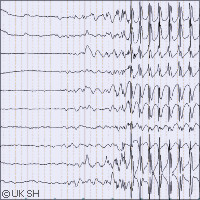Scientists identify mutation linked to common form of epilepsy
A team of EU-funded scientists has discovered that a mutation on chromosome 15 is linked to a common form of epilepsy. The findings, which are published in the journal Nature Genetics, add to our understanding of the underlying causes of epilepsy and could eventually lead to the development of new drugs to treat the condition. EU support for the work came from the EPICURE ('Functional genomics and neurobiology of epilepsy: a basis for new therapeutic strategies') project, which is financed through the 'Life sciences, genomics and biotechnology for health' Thematic area of the Sixth Framework Programme (FP6). Epilepsy is one of the most common diseases of the central nervous system, and affects up to 30 million people worldwide. Around half of all cases have a strong genetic component, and so far about 20 genes linked to the condition have been discovered. However, these genes are linked to very rare forms of epilepsy, and the genetic risk factors behind more common forms of the disease remain unknown. This study focused on idiopathic generalised epilepsy (IGE), which accounts for one third of all epilepsies. The scientists studied the DNA of over 1,000 people with IGE and compared it to the DNA of over 3,500 people without the condition. They found that a small section of chromosome 15 was missing in 1% of the IGE patients. None of the healthy people tested had this deletion. Previous research has linked the same deletion on chromosome 15 to intellectual disabilities, schizophrenia and other neuropsychiatric conditions. Further research on the patients with the deletion revealed that some had inherited the mutation from their parents, while in others the mutation appears to have arisen spontaneously. One of the mothers who also had the deletion suffered from panic disorder. However, the other parents identified as carrying the mutation appeared to have no symptoms. The deleted section of DNA contains at least seven genes, including one that codes for a protein called CHRNA7 (neuronal nicotinergic acetylcholine receptor). CHRNA7 regulates signalling between nerve cells, and mutations in related genes have been linked to epilepsy in previous research. The new findings add considerably to our knowledge of the molecular mechanisms involved in both epilepsy and the other disorders linked to this mutation. At the same time, the discovery that the mutation is linked to such a wide range of conditions, but leaves some patients unaffected, means that it would be difficult to use this mutation in a genetic counselling session, for example. Nevertheless, the researchers are optimistic that their work will eventually lead to the development of new treatments for epilepsy. Meanwhile, more research is needed to unravel the complex genetics behind this neurological disorder.



